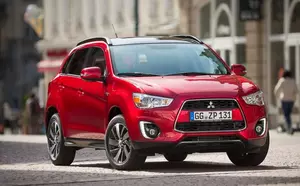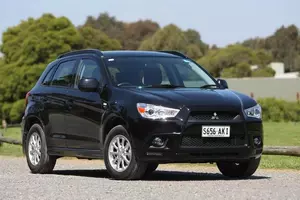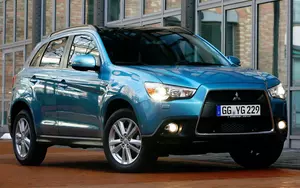


| Vehicle | Curb weight | Difference from world's smallest | Weight to power ratio | 0—60 mph acceleration ratio | Consumption ratio |
|---|---|---|---|---|---|
| 2.0 |
1386 kg / 3056 lbs |
961 kg (2119 lbs) heavier | 9 kg to 1 hp | 125 kg/s (276 lbs/s) |
213 kg/L (470 lbs/L) |
| Vehicle | 2.0 |
|---|---|
| Curb weight |
1386 kg / 3056 lbs |
| Difference from world's smallest | 961 kg (961 lbs) heavier |
| Weight to power ratio | 9 kg to 1 hp |
| 0—60 mph acceleration ratio | 125 kg/s (276 lbs/s) |
| Consumption ratio |
213 kg/L (470 lbs/L) |

| Vehicle | Curb weight | Difference from world's smallest | Weight to power ratio | 0—60 mph acceleration ratio | Consumption ratio |
|---|---|---|---|---|---|
| 1.6 Di-D |
1320 kg / 2911 lbs |
895 kg (1974 lbs) heavier | 12 kg to 1 hp | 125 kg/s (276 lbs/s) |
287 kg/L (633 lbs/L) |
| 1.6 |
1260 kg / 2778 lbs |
835 kg (1841 lbs) heavier | 11 kg to 1 hp | 116 kg/s (256 lbs/s) |
221 kg/L (487 lbs/L) |
| 2.2 Di-D |
1520 kg / 3352 lbs |
1095 kg (2415 lbs) heavier | 10 kg to 1 hp | 148 kg/s (326 lbs/s) |
262 kg/L (578 lbs/L) |
| Vehicle | 1.6 Di-D |
|---|---|
| Curb weight |
1320 kg / 2911 lbs |
| Difference from world's smallest | 895 kg (895 lbs) heavier |
| Weight to power ratio | 12 kg to 1 hp |
| 0—60 mph acceleration ratio | 125 kg/s (276 lbs/s) |
| Consumption ratio |
287 kg/L (633 lbs/L) |
| Vehicle | 1.6 |
| Curb weight |
1260 kg / 2778 lbs |
| Difference from world's smallest | 835 kg (835 lbs) heavier |
| Weight to power ratio | 11 kg to 1 hp |
| 0—60 mph acceleration ratio | 116 kg/s (256 lbs/s) |
| Consumption ratio |
221 kg/L (487 lbs/L) |
| Vehicle | 2.2 Di-D |
| Curb weight |
1520 kg / 3352 lbs |
| Difference from world's smallest | 1095 kg (1095 lbs) heavier |
| Weight to power ratio | 10 kg to 1 hp |
| 0—60 mph acceleration ratio | 148 kg/s (326 lbs/s) |
| Consumption ratio |
262 kg/L (578 lbs/L) |

| Vehicle | Curb weight | Difference from world's smallest | Weight to power ratio | 0—60 mph acceleration ratio | Consumption ratio |
|---|---|---|---|---|---|
| 1.6 MIVEC |
1260 kg / 2778 lbs |
835 kg (1841 lbs) heavier | 11 kg to 1 hp | 116 kg/s (256 lbs/s) |
217 kg/L (478 lbs/L) |
| 1.6 DI-D |
1445 kg / 3186 lbs |
1020 kg (2249 lbs) heavier | 13 kg to 1 hp | 133 kg/s (293 lbs/s) |
289 kg/L (637 lbs/L) |
| 2.3 DI-D |
1545 kg / 3407 lbs |
1120 kg (2470 lbs) heavier | 10 kg to 1 hp | 150 kg/s (331 lbs/s) |
266 kg/L (587 lbs/L) |
| 2.0 |
1455 kg / 3208 lbs |
1030 kg (2271 lbs) heavier | 10 kg to 1 hp | - |
180 kg/L (397 lbs/L) |
| 1.8 Di-D |
1460 kg / 3219 lbs |
1035 kg (2282 lbs) heavier | 10 kg to 1 hp | - |
256 kg/L (564 lbs/L) |
| 1.8 |
1390 kg / 3065 lbs |
965 kg (2128 lbs) heavier | 10 kg to 1 hp | - |
183 kg/L (404 lbs/L) |
| 1.6 |
1275 kg / 2811 lbs |
850 kg (1874 lbs) heavier | 11 kg to 1 hp | 118 kg/s (260 lbs/s) |
213 kg/L (470 lbs/L) |
| 1.8 DI-D |
1505 kg / 3319 lbs |
1080 kg (2382 lbs) heavier | 13 kg to 1 hp | 149 kg/s (329 lbs/s) |
289 kg/L (637 lbs/L) |
| 2.2 DI-D |
1520 kg / 3352 lbs |
1095 kg (2415 lbs) heavier | 10 kg to 1 hp | 148 kg/s (326 lbs/s) |
262 kg/L (578 lbs/L) |
| Vehicle | 1.6 MIVEC |
|---|---|
| Curb weight |
1260 kg / 2778 lbs |
| Difference from world's smallest | 835 kg (835 lbs) heavier |
| Weight to power ratio | 11 kg to 1 hp |
| 0—60 mph acceleration ratio | 116 kg/s (256 lbs/s) |
| Consumption ratio |
217 kg/L (478 lbs/L) |
| Vehicle | 1.6 DI-D |
| Curb weight |
1445 kg / 3186 lbs |
| Difference from world's smallest | 1020 kg (1020 lbs) heavier |
| Weight to power ratio | 13 kg to 1 hp |
| 0—60 mph acceleration ratio | 133 kg/s (293 lbs/s) |
| Consumption ratio |
289 kg/L (637 lbs/L) |
| Vehicle | 2.3 DI-D |
| Curb weight |
1545 kg / 3407 lbs |
| Difference from world's smallest | 1120 kg (1120 lbs) heavier |
| Weight to power ratio | 10 kg to 1 hp |
| 0—60 mph acceleration ratio | 150 kg/s (331 lbs/s) |
| Consumption ratio |
266 kg/L (587 lbs/L) |
| Vehicle | 2.0 |
| Curb weight |
1455 kg / 3208 lbs |
| Difference from world's smallest | 1030 kg (1030 lbs) heavier |
| Weight to power ratio | 10 kg to 1 hp |
| 0—60 mph acceleration ratio | - |
| Consumption ratio |
180 kg/L (397 lbs/L) |
| Vehicle | 1.8 Di-D |
| Curb weight |
1460 kg / 3219 lbs |
| Difference from world's smallest | 1035 kg (1035 lbs) heavier |
| Weight to power ratio | 10 kg to 1 hp |
| 0—60 mph acceleration ratio | - |
| Consumption ratio |
256 kg/L (564 lbs/L) |
| Vehicle | 1.8 |
| Curb weight |
1390 kg / 3065 lbs |
| Difference from world's smallest | 965 kg (965 lbs) heavier |
| Weight to power ratio | 10 kg to 1 hp |
| 0—60 mph acceleration ratio | - |
| Consumption ratio |
183 kg/L (404 lbs/L) |
| Vehicle | 1.6 |
| Curb weight |
1275 kg / 2811 lbs |
| Difference from world's smallest | 850 kg (850 lbs) heavier |
| Weight to power ratio | 11 kg to 1 hp |
| 0—60 mph acceleration ratio | 118 kg/s (260 lbs/s) |
| Consumption ratio |
213 kg/L (470 lbs/L) |
| Vehicle | 1.8 DI-D |
| Curb weight |
1505 kg / 3319 lbs |
| Difference from world's smallest | 1080 kg (1080 lbs) heavier |
| Weight to power ratio | 13 kg to 1 hp |
| 0—60 mph acceleration ratio | 149 kg/s (329 lbs/s) |
| Consumption ratio |
289 kg/L (637 lbs/L) |
| Vehicle | 2.2 DI-D |
| Curb weight |
1520 kg / 3352 lbs |
| Difference from world's smallest | 1095 kg (1095 lbs) heavier |
| Weight to power ratio | 10 kg to 1 hp |
| 0—60 mph acceleration ratio | 148 kg/s (326 lbs/s) |
| Consumption ratio |
262 kg/L (578 lbs/L) |

| Vehicle | Curb weight | Difference from world's smallest | Weight to power ratio | 0—60 mph acceleration ratio | Consumption ratio |
|---|---|---|---|---|---|
| 1.6 DOHC MIVEC |
1260 kg / 2778 lbs |
835 kg (1841 lbs) heavier | 11 kg to 1 hp | 117 kg/s (258 lbs/s) |
210 kg/L (463 lbs/L) |
| 1.8 DI-D DOHC MIVEC |
1510 kg / 3330 lbs |
1085 kg (2393 lbs) heavier | 10 kg to 1 hp | 159 kg/s (351 lbs/s) |
265 kg/L (584 lbs/L) |
| Vehicle | 1.6 DOHC MIVEC |
|---|---|
| Curb weight |
1260 kg / 2778 lbs |
| Difference from world's smallest | 835 kg (835 lbs) heavier |
| Weight to power ratio | 11 kg to 1 hp |
| 0—60 mph acceleration ratio | 117 kg/s (258 lbs/s) |
| Consumption ratio |
210 kg/L (463 lbs/L) |
| Vehicle | 1.8 DI-D DOHC MIVEC |
| Curb weight |
1510 kg / 3330 lbs |
| Difference from world's smallest | 1085 kg (1085 lbs) heavier |
| Weight to power ratio | 10 kg to 1 hp |
| 0—60 mph acceleration ratio | 159 kg/s (351 lbs/s) |
| Consumption ratio |
265 kg/L (584 lbs/L) |